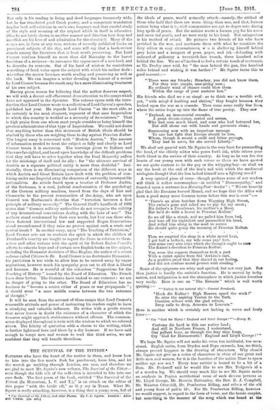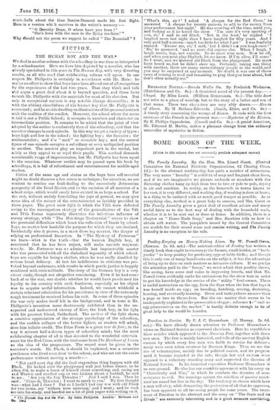THE SURVIVAL OF THE FITTEST.* Barnum who have the heart
of the matter in thorn, and know how to bite into tho live man's flesh for parchment, loose him, and let the wretch go rankling through London, are rare, and therefore we are glad to meet Mr. Squire's new volume, The Survival of the FiUest- even though the title rile of the cclketion is intended to bite into our own flesh. The first roem of the kook, entitled "The Survival of the Fittest (In Memoriam, L. C. and T.)," is an attack on the editor of this paper "with the Lridle off," as th y say in Texas. What Mr. Squire is really attacking, however, is a thing that a young man, full of
• he Survival of the latest, and other Peeves. By J. C. Squire. London : Allen and Unwin. 113. net.1 the ideals of peace, would naturally attack—namely, the attitud of those who hold that there are worse thing; than war, and that, human nature being what it ia civil communities are apt to degenerate during long spells of peace. But the satirist wants a human peg for his scorn and saeva ind patio, and we were ready to his hand. Not uningenious is his method of attack He pictures two friends of his who have perished in the war, and contrasts them with what he considers the fiery editor in easy circumstances, w' o is shelter ng himself behind grey hairs and a rampart of pens, paper, and ink—defending with unheard-of gallantry a twentieth-lino trench, three hundred mike behind the line. We areal inclined to feel a certain touch of contempt, as Mr. Dooley once said, for "the man behind the gun, five hundred miles behind and wishing it was further I" Mr. Squire turns this to good account :—
"These were my friends ; Strachey, you did not know them, For they were simple, unaapirmg' men ; No ordinary wind of chance could blow them Within the range of your austerer ken."
His friends who died we e so simpl: as to think wa- a terrible evil, yet, "with minghd loathing and elation," they fought because they looked upon the war as a crusade. Then come some really fine lines, where the satire leaps up into the flame of true poetry. They saw "England, an immemorial crusader, A great dream-statue, seated and serene, Who had soon much blood, and sons who had betrayed her, But still shone out with hands and garments clean ; Summoning now with an imperious message To one last fight that Europe should be free, Whom, though it meant a swift and bitter passage, They had to servo, for she served Liberty."
We shall not quarrel with Mr. Squire in the very least for pummelling the head, of the elderly editor who pours forth ink, while others pour forth blood in the service of their country. As long as he can fire the hearts of our young men with such verses as those we have quoted we are quite content to be the peg or the whipping-boy—or shall we say the hook at the end of tho lion's tail with which the mediaeval zoologists thought that the lion lashed himself into a fighting mood?
A very spirited piece of verse—though perhaps some of our readers will think it rather commonplace—is entitled " Homoeopathy," and founded upon a sentence in a Morning Post "leader " : "We are heartily glad that the Russians burned Memel, and we hope that the Allies will burn a good many more German towns before this war is over" " There's an alien butcher down Wapping High Street, The swine's gone and asked mo to pay for my moat; His father's a Frenchman, his mother's a Moor, But he'd do with a lesson in Prussian Kultur.'
So we off like a streak, and we pulled him from bed, And tore off his nightshirt and pummelled his head, And rolled him along in the mud to secure He should quite grasp the meaning of Prussian Kultur.
• • • • Then we emptied the shop in a white moral heat, I got half a bullock, my wife some pigs' feet, And some very nice tripe which sho thought ought to ours The Kaiser's devotion to Prussian Kultur.
Yes, even the coppers themselves took a part With a cutlet apiece from Sid 'Awkins's cart, As a positive proof that they shared in our fooling, And did not confuse moral protest with stealing."
Some of the epigrams are witty and spirited, but not very just. But then justice is hardly the satirist's function. He is moved by indig- nation, and indignation is not the atmosphere in which justice breathes very easily. Here is one on "The Enteute " which is well worth quoting :—
" Turkey Is our natural ally!--Ceneral Pernhardi.
Hoch die Kultur ! High Heaven speed the work So cries the aspiring Teuton to the Turk. Creation echoes with the glad refrain, Deep calls to deep, Armenia to Louvain."
Here is another which is certainly not lacking in verve and lively force :—
" • Cry "-Cod for Harry ! England and Ssint George ! "'—Henry
Customs die hard in this our native land ; And still in Northern France, I understand, Our gallant boys, as through tho fray they forge, Cry God for Harmsworth ! England and Lloyd George ! ' " We hope Mr. Squire will not make his verse too incidental, too occa- sional. English satire, from Dryden and Pope onwards, has, we think, always proved happiest in the drawing of characters. Why should Mr. Squire not give us a series of characters in vbrso of our great and little men and women, for it is the function of the satiric Muse to spare neither age nor sex ? Every true satirist is bound to be a bit of a Hun. Mr. Pecksniff said he would like to see Mrs. Todgers's id a of a wooden leg. We should very much like to see Mr. Squire make an analysis in Popian antithetical verse of such diverse persons as Mr. Lloyd George, Mr. Horatio Bottomley, the Rev. R. J. Campbell, Mr. Winston Churchill, Mr. Pemberton Billing, and others of the old and young lions of pubic life. For Mr. Pemberton Billing, however we would suggest, in regard to the form of verse, not the heroic couplet, but something in the manner of the song which was heard at the reusie-halls about the time Santos-Dumont made his fast flight. Here is a version whi_h survives in the writer's memory :— 0 Dorothy Dean, 0 where have you been ? ' 'She's been with the man in the flying machine.'" Why should not the poem wo suggest be called "The Bounded " ?



































 Previous page
Previous page